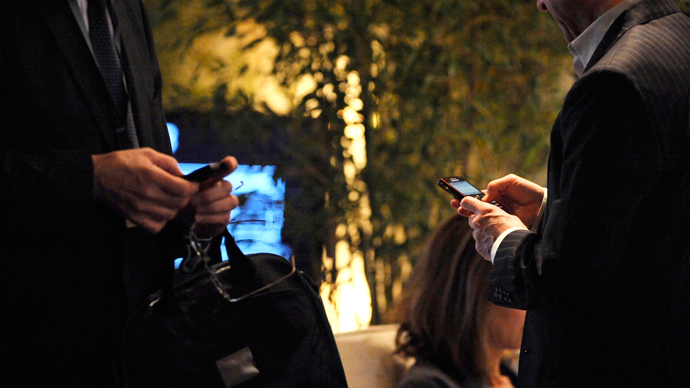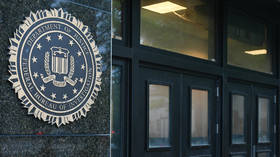‘Stingray’ surveillance devices can degrade service for any cell phone in vicinity - report

Surveillance technology known as ‘Stingray’ -- used to trick phones into connecting to them by mimicking cell towers -- can block or drop phone calls and disrupt other mobile devices that use the same cell network, according to a recent court disclosure.
As RT reported last month, the American Civil Liberties Union (ACLU) recently disclosed that law enforcement officials in Florida used ‘Stingray’ surveillance to track cell phone locations on more than 1,800 occasions, all without court search warrants.
The Harris Corporation’s ‘Stingray’ is the most well known of the controversial spying technology, used by the FBI, the Secret Service, the Drug Enforcement Agency and many state and local police agencies. By impersonating cell towers, the devices force phones in the area to broadcast information that can be used to identify and locate users.
READ MORE: FBI silently changes cell phone tracking policy
The ACLU’s recent disclosure included a court filing that uncovered the ability of 'Stingray' to negate cell phone calls by either downgrading mobile devices from 3G and 4G connectivity to 2G -- enabling them to access identification and location information -- or by the devices' "catch-and-release" operations.
“As each phone tries to connect, [the stingray device] will say, ‘I’m really busy right now so go use a different tower. So rather than catching the phone, it will release it,” Chris Soghoian, the ACLU’s chief technologist, told WIRED of the “catch-and-release” theory.
The court filing made by FBI Special Agent Michael A. Scimeca did not specify how a ‘Stingray’ would disrupt calls, only that they had the ability to do so.
“The moment it tries to connect, [the stingray] can reject every single phone” that is not the targeted phone, Soghoian added.
‘Stingray’ devices are small enough to fit in a police vehicle and can even be carried by hand. They can identify telephone numbers, unique identifying numbers, and the locations of all cell phones in range. They can also log the phone numbers called and texted by a connected phone.
READ MORE: US police employ radar to ‘look’ through walls - report
There has been much secrecy surrounding their use, as law enforcement agencies adhere to non-disclosure agreements made with the manufacturers of the devices.
“We think the fact that stingrays block or drop calls of cell phone users in the vicinity should be of concern to cell service providers, the FCC [Federal Communications Commission], and ordinary people,” Nathan Wessler, staff attorney at the ACLU Speech, Privacy & Technology Project, told WIRED.
“If an emergency or important/urgent call (to a doctor, a loved one, etc.) is blocked or dropped by this technology, that’s a serious problem.”
As WIRED noted, law enforcement have been caught using deception to justify the use of 'Stingray' devices, or they have just used the tools without a warrant.
Nice analysis by @kimzetter of what Stingrays do to innocent bystanders. We need public facts, open debate, not secret demands for backdoors
— adam shostack (@adamshostack) March 2, 2015
An official with the Federal Communications Commission, the regulating body of radio-frequency tools like ‘Stingray,’ told WIRED that she could not comment on specific capabilities of the devices.
“We can’t comment on how the devices operate because that information is confidential in accordance with the FCC’s application process,” she said, adding that the Harris Corporation had “requested confidentiality in the application process.”
If “wireless customers experiencing unexplained service disruptions or interference” report problems to the agency, she said, the FCC would “investigate the causes.”
The ACLU’s disclosure last month came amid a growing awareness of unchecked surveillance being conducted with ‘Stingray’ tools by local police departments around the country.
READ MORE: San Diego police sued over tracking cell phones with 'stingray'
The New York Civil Liberties Union (NYCLU) was also in court recently, seeking the release of information about the Erie County Sheriff’s Office’s use of surveillance technology.
“Stingrays are not highly secret military equipment as the sheriff would have this court believe,” the NYCLU wrote in its legal brief. “They are tools used by many local civilian agencies in everyday investigations against American citizens.”
The NYCLU took legal action after the sheriff’s office denied part of the group’s request for information under the Freedom of Information Act. Sheriff’s office attorney Andrea Schillaci said disclosing the information would give away confidential law enforcement investigative techniques.
“The issue of the capabilities of the equipment is of paramount importance, not just to the local law enforcement, but to the FBI and to other national agencies,” Schillaci told the Associated Press.
The judge in the case has not yet made a ruling.
Congress is also concerned. In December, a US Senate committee sent a letter to the Departments of Justice and Homeland Security seeking answers about the use of Stingray by federal law enforcement.
As WIRED reported, Senator Bill Nelson recently said on the Senate floor that ‘Stingray’ technology “poses a grave threat to consumers’ cell phone and internet privacy,” a speech that marked a new tenor on Capitol Hill regarding the devices. Yet Nelson’s invective may have been political cover for the ‘Stingray’ industry, as his second-biggest campaign contributor is the Harris Corporation.












